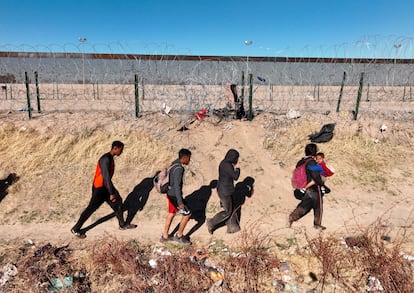Court action on Texas’ migrant arrest law adds to confusion at the border
A Wednesday hearing of the Fifth Circuit Court of Appeals ended without a ruling, leaving the controversial SB4 on hold for now. The law has been ‘categorically’ rejected by Mexico as it allows state authorities to detain and deport immigrants

The latest courtroom action on a Texas law that would allow the state to arrest and deport people who enter the U.S. illegally sowed more confusion at the nation’s border with Mexico on Wednesday. A much-anticipated hearing before a three-judge panel of the 5th U.S. Circuit Court of Appeals ended without a ruling, leaving the new law on hold for now.
During Wednesday’s hearing, Judge Priscilla Richman questioned how the state law would be carried out, including how Texas would respond if federal authorities don’t cooperate with a state judge’s order to deport someone. Meanwhile, the U.S. Department of Homeland Security has said it would not have authority to deport under the state law.
The toughest anti-immigration law in the United States was in effect for about eight hours and 40 minutes on Tuesday following a decision from the U.S. Supreme Court. But the Fifth Circuit Court of Appeals on Tuesday night again blocked the controversial Texas rule.
The court’s decision came just hours after the conservative majority in the U.S. Supreme Court allowed the law, known as SB4, to go into effect. The rule, signed into law last December by Governor Greg Abbott, creates new offenses, punishable by up to 20 years in prison, for those who enter the country irregularly. The most controversial aspect of the law — which Mexico has “categorically rejected” — allows the state to deport migrants, until now a power exclusive to the federal government.
“This is clearly a positive development,” said Governor Abbott, who is on a crusade against irregular immigration coming into his state, after the Supreme Court lifted the pause on the law.
But later in a 2-1 order, an appeals court panel continued the legal seesaw surrounding the Texas law, again putting it on pause ahead of the Wednesday hearing, which ultimately ended without a ruling. It was not clear how quickly the next decision might come.
The Biden administration sued the Texas government on the grounds that SB4 “alters the status quo that has existed between the United States and the States in the context of immigration for almost 150 years.” Following the Circuit Court of Appeals’ ruling, either party can appeal to the Supreme Court.
If it comes into effect, the rule will allow state law enforcement to request papers from anyone in virtually any location, with the exception of schools, churches, hospitals, and health centers. Immigration document checks will not be exclusive to border counties, but may be conducted in cities far from the border with Mexico.
The Mexican government criticized the law during the brief period that it was in force. “Mexico categorically rejects any measure that allows state or local authorities to exercise immigration control, detain, and return nationals or foreigners to Mexican territory,” the Foreign Ministry said in a statement. The Foreign Ministry stated that the new legislation creates a “hostile environment” in Texas, which has 10 million inhabitants of Mexican origin. The Mexican government affirms that it will play the role of Friend of the Court before the panel of judges in Louisiana to report on the impact that the law will have on the Mexican-American community.
The conservative majority of the Supreme Court, formed during Donald Trump’s administration, allowed the measure to go into effect by a 6-3 vote. The progressive minority justices’ dissent rejected the majority’s decision. Justice Sonia Sotomayor, the only Latina on the Supreme Court, noted that the Texas law “upends the federal-state balance of power that has existed for over a century.” Sotomayor also argued that the decision would lead to more disorder at the border, which saw record-high arrests in 2023.
In another opinion, conservative justices Amy Coney Barrett and Brett Kavanaugh claimed that their vote with the majority did not mean they agreed with the substance of SB4. The justices argued that their decision is procedural only, adding that they expect to further address the matter once the Fifth Circuit Court of Appeals issues its ruling on the law.
The Texas government argued that the law is a product of the Biden administration’s inaction on the border. The legislation easily passed the Republican-led state legislature. State authorities claim that SB4 will be a tool to help them control an “invasion” at the border. Abbott and his administration have been able to gather support from several Republican leaders, who have been very critical of President Biden’s management of immigration.
This law’s long judicial journey began in late February, when a federal district judge blocked it, calling it unconstitutional. “[To] allow Texas to permanently supersede federal directives on the basis of an invasion would amount to nullification of federal law and authority — a notion that is antithetical to the Constitution and has been unequivocally rejected by federal courts since the Civil War,” Judge David Ezra wrote in his 114-page decision.
Like other critics of SB4, the judge believes that the law has several similarities with SB1070, the law passed by the Arizona government in 2010, which allowed local law enforcement to ask for papers from virtually anyone suspected of having entered the country illegally. SB1070 was in court for two years. In June 2012, the Supreme Court struck down several aspects of it and let others stand. One of the court’s findings was that only the federal government has the power to issue laws against illegal immigration.
Human rights organizations have also criticized SB4, which should have gone into effect on March 5. “The law’s implementation would lead to racial profiling, separate families, and harm Black and Brown communities across the state,” said the Las Americas Immigrant Advocacy Center. Jennifer Babaie, the group’s director, has vowed to continue the court battle so that everyone, regardless of immigration status, “has the freedom to move and the freedom to thrive.”
Sign up for our weekly newsletter to get more English-language news coverage from EL PAÍS USA Edition









































